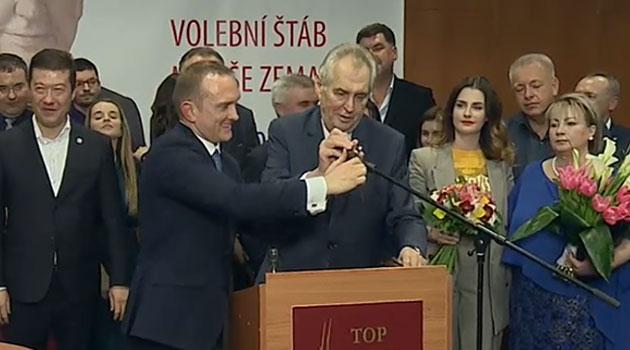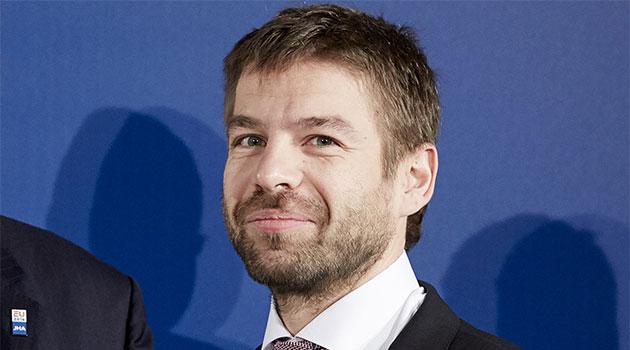Analysis: Czech Fascists and fascisizing politicians, yesterday and today (Part One)

The Czech Republic is heading toward authoritarian government. The prime movers in this respect are Czech President Miloš Zeman, Czech Prime Minister Andrej Babiš, and Czech MP Tomio Okamura and his “Freedom and Direct Democracy” (SPD), all of which are supported by the Communist Party of Bohemia and Moravia (KSČM).
Okamura is recognized as being a nationalist, a populist, a racist and a xenophobe. We also have a traditional expression from the time of the First Republic that combines all the meanings of those words in one: a Fascist.
We are also paying careful attention to the behavior of other parties and politicians. Let’s not forget: All begins with rhetoric.
Flaw of the system
Okamura’s rhetoric is not just deceptive and demagogic. it overlaps with the rhetoric (and frequently also with the demands) of the interwar European Fascists, including the Czechoslovak ones. Naturally, he is voicing this rhetoric during a time that is different from that of the 1920s, 1930s and 1940s, but in the same way it is sparking the same mood as the one those Fascists created: fear, hatred or intolerance toward minorities, primarily toward immigrants, refugees and Romani people, contempt for representative democracy, and disrespect for democratic institutions and values.
He may talk about democracy nonstop, just like the Communists here always did, but the rest of Okamura’s rhetoric and his practical demands have nothing to do with democracy whatsoever. Similar sins have been committed by President Zeman as well, who has changed his opinions so many times that he has moved into the ultra-right in many respects.
Just like Okamura and his SPD, various Fascist and neo-Nazi militants are also beginning to take action here. Take, for example, the Workers’ Social Justice Party (Dělnická strana sociální spravedlnosti- DSSS).
That party’s chair, Tomáš Vandas, has gone so far as to have been labeled a neo-Nazi by Zeman himself! Even the governing ANO movement is sending very contradictory signals.
That movement swings from defending human Rights (through Czech Justice Minister Pelikán) to a pure-blooded populism, xenophobia and contempt for democratic institutions, Parliament first and foremost, which both the PM and other ANO politicians engage in. The practical politics and rhetoric of both the Czech Social Democratic Party (ČSSD) and the Civic Democratic Party (ODS) are also xenophobic to a certain extent.
Sometimes xenophobia is committed by politicians from the Mayors and Independents (STAN) or TOP 09 parties and by individuals such as Čunek of the Christian Democrats. For example, all of those parties initiated a law that makes it possible for a person who is not a permanent resident of a municipality to be require to live outside of the territorial limits of that municipality for three months if he or she has been convicted of committing a misdemeanor three times – such as having a celebration in one’s home past 22:00, for example.
Everybody involved applies this law first and foremost against Romani people. The actions of these parliamentary parties has not yet crossed the line into authoritarianism, rather, they are a “flaw of the system” instead of an attack on it.
Unlike ANO and SPD, these other parties are not inherently against the current system. However, given the proto-Fascist trend that is running across Europe and the USA, that need not last long and all could soon be different.
Interwar Fascism
During the Second Republic (October 1938 until March 1939) and during the Nazi Protectorate of Bohemia and Moravia, Czech Fascists did not actually accede to power because Fascism had been de facto introduced by some of the heretofore democratic parties that were in and of themselves under pressure from without (Hitler) and from within (from the Czech Fascists and Czech Nazis). From the autumn of 1938 the Party of National Unity was in government, comprised of Agrarians, civic parties and some of the National Socialists.
Ultimately the National Fascist Community (Národní obec fašistická) appeared there as well under the direction of Radola Gajda. The opposition was composed of the National Labor Party (Národní strana práce), created from the Social Democrats and the left wing of the National Socialists.
The Communist Party had been dissolved at that time. Their MPs remained in Parliament, but the legislature itself no longer had any voice, because the Party of National Unity enforced an Enabling Act.
That legislation made it possible for the Government to act without Parliament (the same method was used by Hitler in Germany after his rise to power there). It entrusted the relevant legislative commission with elaborating an alteration to the Constitution, transforming it from a democracy to a dictatorship along the model of Fascism in Italy.
On the territory of the Czech and Slovak Republic (as the state was named at the time) the Nazi party, the NSDAP, was allowed to function, the Government introduced the Nuremberg Laws at the German schools on the state’s territory and began preparing anti-Jewish measures that were aimed at society as a whole. “Jews began to be limited in the performance of professions and were fired if they worked for the state administration. Doctors, lawyers, and other professional organizations sought to exclude Jews and to rid themselves of unpleasant competition,” the website Holocaust.cz describes the history.
This was followed by the beginning of establishing labor camps. The Czechoslovak Interior Ministry also ordered the return of ethnic Germans who were anti-Nazi, of Jewish people, and of any refugees to the Sudeten areas of the country.
What the Czech Fascists and Nazis had in common
The Czech interwar Fascists had identified with Benito Mussolini’s Fascism in Italy, but unlike that ideology, they were anti-Jewish to a fanatical extent. During the ascension of German Nazism some of them inclined toward Hitler’s party and after the creation of the Protectorate they became the worst of the collaborators with the Nazi regime.
Some larger groups had espoused Hitler’s National Socialism from the beginning. However, all of these groups, in addition to their methods and procedures, had some principles in common that they fulfilled through their politics in practice, their rhetoric, and their street battles:
1) Very strong antisemitism and xenophobia – inciting fear and hatred of Freemasons, homeless people, Jewish people, the refugees who fled first from Hitler’s Germany and then from the Sudeten areas, and Romani people.
2) Inciting hatred against their political opponents – the Communists and the democrats.
3) Permanently assaulting democracy in its parliamentary, representative form.
4) Labeling those with different opinions as betrayers of the homeland (back then the expression “treason” was used most abundantly).
These groups differed in just one point: The Czech Fascists emphasized an ethnically pure nation-state, if possible without Germans, Jews, or Roma. The Czech Nazi groups, on the other hand, wanted the Czech nation to be subordinated to the Germans.
Attack on democracy
Similar signs today in our country are being displayed by Okamura and, in a certain segment of these areas, also by Zeman (in the nature of his opposition to democratic customs, to his political rivals, and to receiving refugees). Neither of them has anything against the Communists, on the contrary (with the exception of anti-Bolshevism).
Instead of agitating against Jews, today’s Fascisizing politicians agitate against migrants, against Muslims as a whole, and against refugees fleeing war. Okamura also emphasizes the nation-state, which he would most like to cleanse of migrants and Romani people.
The SPD also want the Czech Republic to leave the European Union, which the party deceptively generally presents as an enemy, as the supranational framework of the EU prevents the party from implementing its policies. Their weapon of choice against this is to wage a permanent assault on parliamentary democracy, and their instrument for this is the referendum.
I will write more in the next installment of this analysis about referendums as a tool of populism leading to dictatorship. Just like the interwar Fascists, Okamura is labeling people with opinions different to his as “traitors”.
I will also write more next time about Fascist rhetoric during the interwar period and today. The information here is drawn primarily from two books on this topic, Ivo Pejčoch’s Fašismus v českých zemích 1922 – 1945 (Academia: 2011) [Fascism in the Czech Lands 1922 -1945] and a book by Tomáš Pasák entitled Český fašismus a kolaborace, 1922 – 1945 (Práh: 1999) [Czech Fascism and Collaboration, 1922-1945], as well as from the Holocaust.cz website and Romea.cz.
